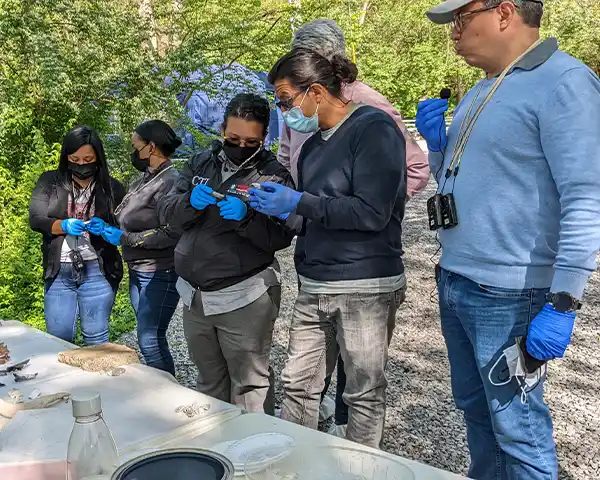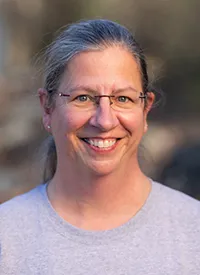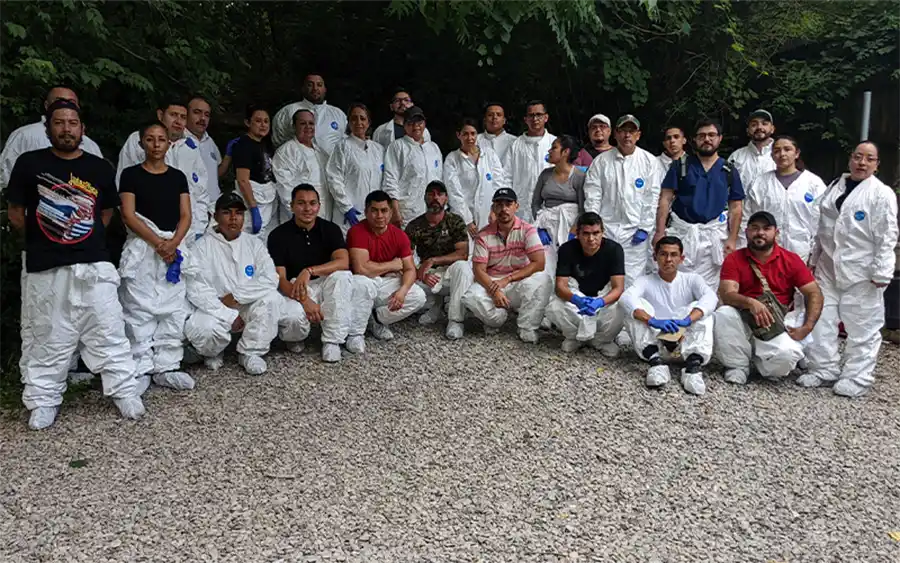News from the Forensic Anthropology Center

Charity Owings received two faculty research assistant funding awards to mentor undergraduate Jack Orebaugh in his novel research studying blow flies at the Anthropology Research Facility using transmission electron microscopy. Jack also served as a research assistant during the summer assisting with the collection of entomology samples and decomposition descriptions of four donors.
FAC Faculty Research
Giovanna Vidoli is a co-principal investigator with Zach Burcham from microbiology on a National Institute of Justice funded grant, “Expanding and validating microbiome database for estimating the postmortem interval” awarded to Colorado State University.
Dawnie Steadman is a co-principal investingator with Audris Mockus (Min H. Kao Department of Electrical Engineering and Computer Science) and Jennifer DeBruyn (Department of Biosystems Engineering and Soils Sciences) on a grant “Deep Learning Methods for Postmortem Interval Estimation” funded by the National Institute of Justice. Dawnie is also collaborating with Shawn Campagna from chemistry on another grant funded by the National Institute of Justice, titled “Application of Analytical Chemistry to Test the Accuracy of Human Residual Odor Detection by Cadaver Dogs.”
Mary Davis and Giovanna Vidoli were co-principal investigators on a project in St. John, US Virgin Islands, in collaboration with UT Chattanooga’s Jeffrey L. Brown Institute of Archaeology. They assisted in the partial excavation and relocation of a historic cemetery impacted by underground utility work which will improve the island’s infrastructure resiliency during future hurricanes. This project was the first archaeological investigation carried out in the Cruz Bay Historic District.
Undergraduate Research
Three UT Office of Undergraduate Research and Fellowships department research assistants were awarded to Joanne Devlin, Giovanna Vidoli, Mary Davis, and Lee Jantz. Undergraduates Luke Massongill and Tessa Carter researched the accuracy of estimating sex from burned remains. Sara Anderson researched the correlation between the size of joint surfaces of weight-bearing joints and body size.
They all presented their research at UT’s Discovery Day and Luke and Tessa also presented at the Mountain, Swamp, and Beach Conference at Middle Tennessee State University.
Honoree

Giovanna Vidoli organized a session in honor of Lee Meadows Jantz at the Mountain, Swamp, and Beach Conference held at Middle Tennessee State University in November. Distinguished Lecturer Joanne Devlin and Professor Emeritus Richard Jantz, along with graduate students Sara Fatula, Sarah Schwing, Kathleen Hauther, Helen Martin, and Marta Paulson presented papers celebrating Lee’s career and her impact on the field of forensic anthropology.
Short Courses
The FAC annually hosts a variety of courses for law enforcement officers, forensic professionals, and students in forensic programs at other universities around the globe.
This year, we welcomed 228 course participants to UT for training in techniques ranging from the recovery of human remains to the identification of non-human bones. Participants came from two international groups (Colombia and Mexico) and four different universities (DuPage, Lewis, Valparaiso, and Utah Valley).
One highlight was a partnership with the International Criminal Investigative Training Assistance Program, for which the FAC hosted 15 forensic anthropologists from Colombia for a two-week course. The anthropologists engaged in a great exchange of ideas and discussions about the different challenges experienced in Colombia and the US.
